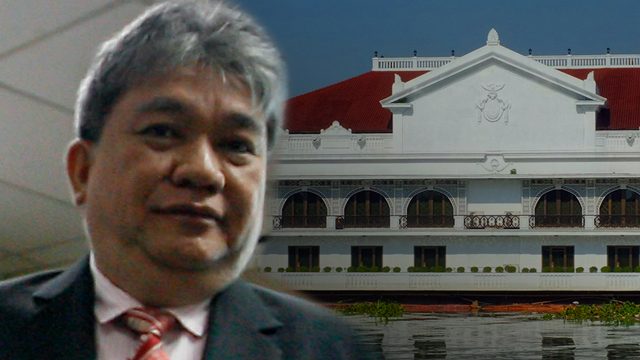SUMMARY
This is AI generated summarization, which may have errors. For context, always refer to the full article.

MANILA, Philippines (UPDATED) – After Malacañang issued a 90-day suspension order against him, Overall Deputy Ombudsman Melchor Arthur Carandang can now go to the Supreme Court (SC) and challenge it.
Carandang may challenge it on the ground that a 2014 SC ruling declared unconstitutional the power of the President to discipline or remove the Deputy Ombudsmen.
Retired Supreme Court justice Vicente Mendoza said that it is Carandang, as the aggrieved party, who can go to the SC and not Malacañang as earlier implied by Presidential Spokesperson Harry Roque.
“OP (Office of the President) wants to revisit that ruling…OP [is] confident it can reverse anew,” Roque said on Monday.
“It will have to be Carandang [who files a case], because he’s the one suspended,” Mendoza said in a phone interview with Rappler.
Carandang may even apply for a temporary restraining order (TRO) at this point.
“My office is ready to defend the action of the Office of the President in suspending Carandang. We are confident that the Supreme Court will reverse its 2014 ruling,” Solicitor General Jose Calida said on Tuesday, January 30.
Carandang was suspended for alleged illegal disclosure of bank details of President Rodrigo Duterte and the first family. Carandang leads the Ombudsman’s investigation into Duterte’s alleged ill-gotten wealth.
Reverse?
Can the SC reverse its ruling?
Integrated Bar of the Philippines (IBP) national president Abdiel Dan Fajardo believes that it can’t.
For Fajardo, the doctrine of stare decisis applies. It is a Latin phrase that means to “stand by decided matters.”
“Article VIII of the Constitution doesn’t even grant SC the power to be an appellate court of its own decision. SC decision when final becomes part of the law of the land per civil code. So being law already, SC may not usurp legislative power by simply reversing it,” Fajardo said.
Though he personally believes the 2014 ruling is correct, Mendoza said the High Court can always reconsider.
Mendoza said, however, that it is wrong to brand it as a reversal.
“You do not reverse because the SC is the last of a hierarchy, there’s no other place to appeal but the SC. If the decision is already final, you cannot ask to reverse it,” he said.
Mendoza added, “In another case, and the same question is raised, the party in the second case can ask SC to reconsider its ruling.”
In the event that the SC decides to put it to a vote, there’s uncertainty for Carandang.
The vote in 2014 was 8-7. Of the 8 votes, only Associate Justices Presbitero Velasco, Teresita Leonardo-de Castro, Lucas Bersamin, and Marvic Leonen are sitting justices.
Of the 7 dissenting votes, Chief Justice Maria Lourdes Sereno, Senior Associate Justice Antonio Carpio, and Associate Justices Diosdado Peralta, Mariano del Castillo, and Estela Perlas-Bernabe remain in the SC.
Who can discipline Ombudsman execs?
The main question is: if not the President, then who can discipline officials from the Office of the Ombudsman?
“To me, the one who can discipline them is the Ombudsman, not the President,” Mendoza said.
Mendoza added that he personally believes the 2014 SC ruling is correct in that “the Office of the Ombudsman is an independent agency.”
Calida, citing Carpio’s dissenting opinion then, said that “the independence of the Office of the Ombudsman is not the same as the independence provided to other governmental bodies such as the Judiciary.”
‘Turf war’
Fajardo said that if and when Ombudsman Conchita Carpio Morales refuses to enforce the suspension order, then Malacañang can go to the SC.
“If [the] Ombudsman defies it and allows Carandang to continue working on the ground that the order is patently illegal, [Malacañang] might have to seek [an] SC writ to enforce it,” Fajardo said.
Another recourse is to file administrative cases against Malacañang officials for enforcing an unconstitutional provision. But that would have to be filed before the Office of the Ombudsman, because they exercise jurisdiction over public officials.
“Then it becomes a turf war,” Fajardo said.
ACT-Teachers Representative Antonio Tinio said Malacañang demonstrated “an utter contempt for the Judiciary and the rule of law that the President is mandated to uphold.”
Aside from administrative cases, can an ethics or a disbarment complaint be filed against, for example, Executive Secretary Salvador Medialdea for issuing the suspension order?
“I’ll leave that to the lawyers. But we all know that he’s merely acting for and in behalf of the President,” Tinio said.
Fajardo declined to comment because ethics cases against lawyers are processed by the IBP.
Asked whether it can lead to a constitutional crisis, Fajardo said: “Not really because the SC ruling was clear. [The] Ombudsman argued that Executive Secretary Salvador Medialdea [who issued the order] was wrong in entertaining the complaint when he had no jurisdiction.” – Rappler.com
Add a comment
How does this make you feel?
There are no comments yet. Add your comment to start the conversation.